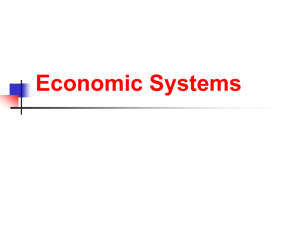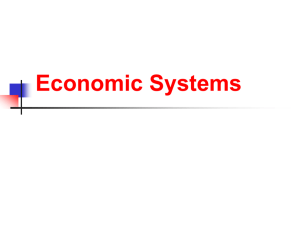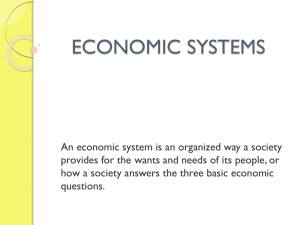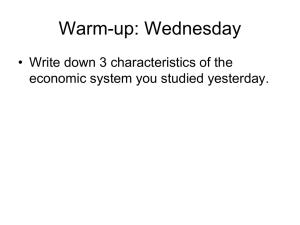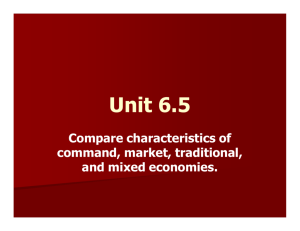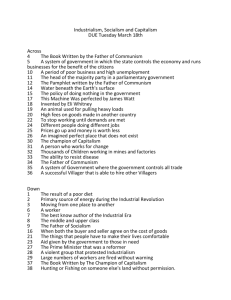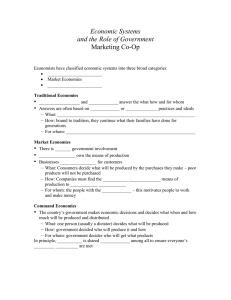Economic Systems PP
advertisement
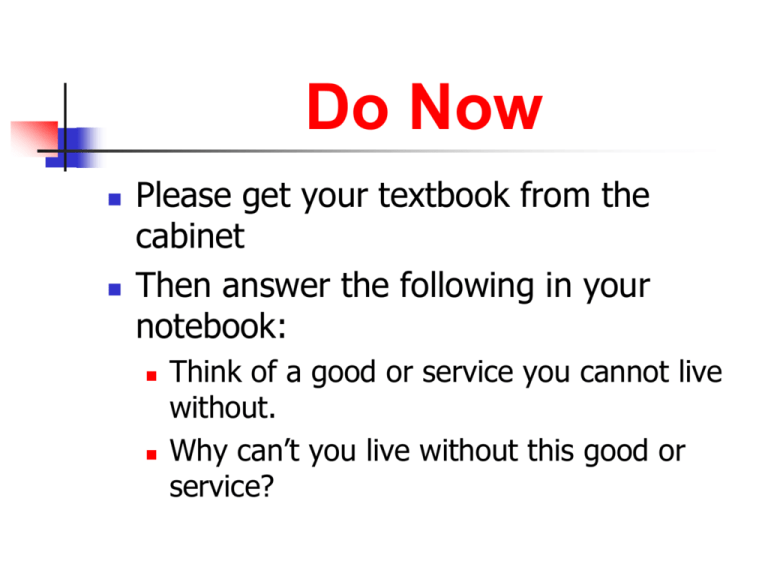
Do Now Please get your textbook from the cabinet Then answer the following in your notebook: Think of a good or service you cannot live without. Why can’t you live without this good or service? Economic Systems https://www.youtube.com/watch?v=ac1OvqiZmh0 Let’s discuss…. After watching the video, with your neighbor discuss what the SS Minnow passengers should do next How Does An Economy Work? Nations must answer 3 basic Economic questions: What goods and services will be produced? How will the goods and services be produced? What needs and wants will be satisfied with the goods and services produced? The way a nation answers these questions defines their economy. Types of Economic Systems All economic systems fall into one of three broad categories: Elements of both Command and Market economies is known as Market Economy Command Economy Traditional Economy Mixed Economy The US Economic System is known as Capitalism/Free Enterprise or Private Enterprise Project Class will be divided into 5 groups You and your group have been shipwrecked on an island (remember Gilligan’s island?) A Pure Market Economy No government involvement in economic decisions The government lets the people answer the three basic economic questions What? Customers decide through their purchases How? This is left up to the individual business –BUT- a business must be profitable Who? People who have money can buy more – this encourages hard work and investments A Pure Command Economy The Government controls the factors of production and makes all the decisions The government is responsible for answering the three economic questions What? One person ( a dictator) or a group of government officials (central planning committee) decide what is to be produced How? The government owns all the factors of production and makes all the decisions about production Who? The government decide who receives what is produced in the economy Mixed Economies Some government involvement through mandatory laws and regulations that businesses follow The government provides social programs for those who need help Labor Laws, Minimum Wage Medicare, welfare All economies are mixed they are classified based on how much the government is involved in the process Continuum of Economic Systems Command Economy Communism On the far left Socialism Left of center but right of communism Market Economy Capitalism On the far right Capitalism An economic system characterized by private ownership of businesses and marketplace competition The government is concerned about its people and takes care of those who cannot care for themselves The political system is a democracy with leaders elected by the people The United States and Japan are examples of a Capitalist Economy Socialism Increased government involvement in people’s lives and the economy The main goal is to keep prices low for all people and to provide employment for many The government runs key industries and makes economic decisions More social services for all and free or low cost medical care Canada, Germany, Sweden, Australia and Great Britain are all examples of socialist economies Communism The government runs everything (Totalitarian government) Only one political party, the Communist party, runs the government All people able to work are assigned jobs – there is virtually no unemployment The government assigns housing, schools, and occupations There is little to no economic freedom Cuba, North Korea, and China are examples Economies In Transition The breakup of the Soviet Union is the best example of a country changing from a Command Economy to a Market Economy State owned industries have been privatized (government owned businesses are sold to private citizens) Today even socialist countries are selling some of their government owned businesses to individuals
